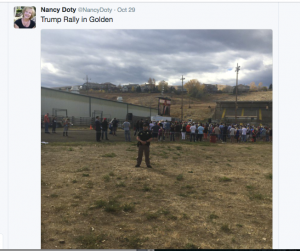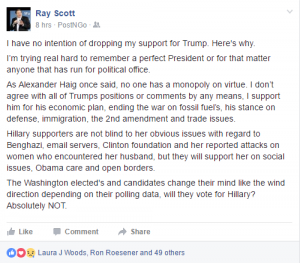Hey ColoradoPolitics, you’ll lose the war against fake news if you put your credibility at risk
Friday, October 13th, 2017Journalists hate fake news, right? And they hate it when they’re accused of being purveyors of fake news. So why would a newspaper put its most valuable asset, its credibility, at risk by publishing fake-news advertisements that look almost exactly like news? And then not answer questions about it?
Don’t ask ColoradoPolitics, a political news site owned by conservative billionaire Phil Anschutz, because that’s what it did this week.
Corey Hutchins, writing for the left-leaning Colorado Independent, reports that ColoradoPolitics will not respond to questions about a deceptive advertisement, designed to mimic a news supplement, that ran in the online and print editions of ColoradoPolitics last week.
That was disappointing, because I thought ColoradoPolitics would respond to reasonable questions like the one in Hutchins’ headline, “Who paid for ‘sponsored content’ and a ‘paid advertisement’ in Colorado’s weekly political newspaper?”
I noticed that the logo on the ColoradoPolitics’ sponsored content/advertisement appears to matche the one used by Coloradans for Responsible Energy Development (CRED). And CRED ran a similar ad insert in The Denver Post a few years ago, with similar pro-oil-and-gas messages. So the answer to Hutchins’ question could well be CRED, but we don’t know for sure. CRED did not return a call.
I had a few other questions about the ad, and I listed them in my email, sent Thursday, to Vince Bzdek, the editor of the Colorado Springs Gazette, also owned by Anschutz. Bzcek oversees editorial direction at ColoradoPolitics. He did not respond, which is too bad because I’ve admired his work and was hoping to hear from him.
Here’s my email to Bzdek. If you happen to know the answers to any of my questions, please let me know.
Hi Vince –
I’m a former freelance media critic at the Rocky, now blogging on media and politics, from a progressive perspective, at BigMedia.org, ColoradoPols, and elsewhere.
…[I thought] you might answer a few questions about the sponsored content that ran in ColoradoPolitics.
I know this is standard industry practice these days, used by The Denver Post and many other newspapers. And I’ve written about The Post’s sponsored content previously here.
My questions are:
- Why is there no mention of the sponsor of the ad in the print or online editions. The logo matches the one used by Coloradans for Responsible Energy Development (CRED), so I’m guessing that’s the sponsor. Is this true? Why not state this on the ad?
- Did you consider making the “Paid Advertisement” in larger type on the print edition. I was glad to see it on all four pages, and you admirably made “Sponsored Content” very large online, though an explanation of what this phrase means might be useful for readers.
- When you Google author “Tim Peters,” who’s the bylined author of the sponsored content, along with the phrase “Colorado Politics, you get “Author at ColoradoPolitics.” Click there, and you get his story, which, to your great credit, is headlined as “sponsored content.” Still, this makes it appear as if he’s a real journalist/author.
- But other than his identification as the author of the sponsored content, Tim Peters appears not to exist. I can’t find him on the energy company websites or on CRED’s site. A fake byline mocks the basic journalistic principle that the author of an article should stand behind it. Do you think the stories should have no byline or the byline of a person that can be reached, even if that person is an energy-company employee?
- I’ve been told I’m wasting my time on this, and journalism has bigger problems. I would agree, but the sponsored content bugs me, because if you want journalism to survive, why put your best asset, your credibility, at risk by brazenly deceiving readers?
Thanks for considering a response to these question, or as many of them as you want to answer.
Nothing lengthy is needed, and feel free to call me if that’s easier. And if you want to respond, I can wait as long as you need to find time for it.
Much appreciated.
Jason Salzman



